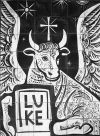
THE GOSPEL OF LUKE
The Adult Jesus: Lk 3,21-38
The Baptism of Jesus: 3,21-22
Luke unlike the other evangelists stresses that all the people were baptised (3,21). As mentioned already, it is notable that we not are told who baptised Jesus. The evangelist wanted to complete what he had to say about John before he introduced Jesus. He also avoids having the greater baptised by the lesser. He is clear though that Jesus was baptised.
The significant alteration by Luke in this verse is that the heavens open whilst Jesus is praying. His baptism has already taken place and it is while as Jesus is at prayer that the Holy Spirit descends on him. This is a notable contrast to Mark 1,10 where the Spirit descends as Jesus comes up out of the water.
Whilst the other Gospels do tell us about Jesus praying (e.g. Mk 1,35), Jesus at prayer is a special emphasis in the Gospel of Luke as we will see. I suggested 22,41 in particular because the prayer of Jesus in the Garden of Gethsemane means the whole of Jesus' minstry from Baptism to the Garden is bracketed by Jesus at prayer.
The Gospels of Mark and Matthew speak of the Spirit and the Spirit of God respectively. Here in Luke it is the Holy Spirit who descends upon Jesus at prayer. The Holy Spirit being another special theme of this Gospel which we have already seen, beginning with the conception of Jesus (1,35).
The outpouring of the Holy Spirit at the end of time is a theme of the prophet Joel (Joel 3,1, or 2,28 in English Bibles); this passage is quoted by Peter in his Pentecost day sermon (Acts 2,16). The Holy Spirit is the guiding force of Luke's programme from beginning (Lk 1,35) to end (Acts 28,25).
Mark and Luke have the voice from heaven saying "You are my beloved Son" whereas in Matthew the voice proclaims "This is my beloved Son". For Mark and Luke, the descent of the Holy Spirit is a personal experience for Jesus. The voice in Matthew is making a public proclamation that Jesus is the Son (which is therefore the version used by the Church for the Feast of the Baptism of the Lord).
The words spoken by the voice are a combination of the Psalm and Isaiah quotations I mentioned. Jesus is Son (Ps 2,7) and he is Servant (Is 42,1).
The Genealogy: 3,23-38
Verse 23 tells us that like Joseph (Gen 42,46) and David (2 Sam 5,4), Jesus was about 30 years old at the beginning of his public life. The verse also adds "as was supposed" about Jesus being the son of Joseph. The Annunciation scene has made clear that Jesus was conceived by the Holy Spirit (1,35). Jesus is just adopted into the line of David.
Genealogies tell us of roots and provide the person's origins and background. As an outline, they are also a good way of covering a lot of history in a few short lines.
Matthew opens his gospel with his genealogy beginning with Abraham. He is saying that his story begins with Abraham and that there is continuity throughout. Matthew therefore uses the genealogy as history.
Luke instead makes the baptism of Jesus his starting point and then traces Jesus from Joseph all the way back to Adam, the Son of God. His stress therefore is on the roots of Jesus and he is giving a universal significance to the message of his Gospel by going back all the way to the first man, Adam who is described as Son of God (1,38). But of course, we have already been told that Jesus is THE Son of God (1,32).
The central role of David in both genealogies is the main point of contact. Whilst Matthew has Jesus descend from Solomon, for Luke the descent comes through the prophet Nathan, bringing out Luke's stress on Jesus as a prophet.
That Jesus is Son of David has been seen in the infancy narrative at 1,27 and 2,4.
Luke omits the women who are highlighted by Matthew in his genealogy. No such complications in this Gospel. That many or most of the other names are different in the two lists is not of great importance for our reading. It is not necessary to try to reconcile the two.
We now return to the main page
